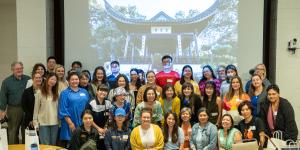On September 29, 2024, the USC U.S.-China Institute hosted a workshop at the Huntington’s Chinese garden, offering K-12 educators hands-on insights into using the garden as a teaching tool. With expert presentations, a guided tour, and new resources, the event explored how Chinese gardens' rich history and cultural significance can be integrated into classrooms. Interested in learning more? Click below for details on the workshop and upcoming programs for educators.
Shao, Qin
USCI Visiting Scholar at the US-China Institute from 2011-2012.
Education
Ph. D. (Modern East Asia), History Department, Michigan State University, 1994
M.A. (Premodern China), History Department, ECNU, Shanghai, China, 1983
B.A. (History), History Department, Anhui Normal University, Wuhu, China, 1977
Academic Honors and Scholarships
Co-PI, Title VI-B (BIE-Business and International Education) grant from the U.S. Department of Education. Project: "Expanding International Business Education at TCNJ to China" 2010-2012 (with Dr. Linghui Tang).
Scholar Grant, Chiang Ching-Kuo Foundation, deferred to 2008-09 from 2007-08.
Residential Fellowship, Radcliffe Institute for Advanced Study, Harvard University, 2007-08.
Keizai Koho Center Fellowship, National Association of Japan-America Societies, 2005.
Research Fellowship, American Council of Learned Societies, 2003.
Research Fellowship, National Endowment for the Humanities, 2001.
Research Grant, the Pacific Cultural Foundation, 1996.
Dissertation Completion Fellowship, the College of Arts and Letters, MSU, 1994.
Research Fellowship, the College of Arts and Letters, MSU, 1993.
Travel Grant, the Henry Luce Foundation, 1992.
Teaching Assistantship, History Department, MSU, 1990-1993.
"Minben: A Concept of Statecraft." Essay Award, the Social Sciences Association of Shanghai Municipality, China, 1986.
"On Egalitarianism." Young Scholar Essay Award, ECNU, China, 1985.
Publications
Culturing Modernity: the Nantong Model, 1890-1930. Stanford University Press, 2004, pp. 351.
Demolition: Everyday Chinese in the Shadow of High-rises: 1980-2010 (under contract with Rowman & Littlefield Publisher as part of the series on State and Society in East Asia; manuscript submission: Summer 2011).
Selected Articles
“Waving the Red Flag: Cultural Memory and Grass-roots Protest in Housing Disputes in China.” Modern Chinese Literature and Culture, Vol. 22, No 1, 2010 (Spring), pp. 197-232.
“Bridge under Water: The Dilemma of the Chinese Petition System.” China Currents, China Research Center, Atlanta Vol. 7, No. 1, 2008 (Winter); http://www.chinacurrents.com/winter_2008/cc_shao.htm.
“A Community of the Dispersed: the Culture of Neighborhood Stock Markets in Contemporary Shanghai.” Chinese Historical Review Vol. 14, No. 2, 2007 (Fall), pp. 212-239.
“Exhibiting the Modern: the Creation of the First Chinese Museum, 1905-1930.” The China Quarterly 179, 2004 (September), pp. 82-100.
“Printing Culture and Local Politics in Early Twentieth Century China.” Zhongguo shehui lishi pinglun (Chinese Social and Historical Review) Vol. 5, 2004. Beijing: Shangwu yinshuguan.
“Tempest over Teapots: the Vilification of Teahouse Culture in Early Republican China.” The
Journal of Asian Studies 57, 4, 1998 (November), pp. 1009-1041.
“Space, Time, and Politics in Early 20th-Century Nantong.” Modern China 23, 1, 1997 (January), pp. 99-129.
“The Mismatch: Ouyang Yuqian and Theater Reform in Nantong, 1919-1922.” CHINOPERL (Chinese Oral and Performing Literature), 1996, pp. 39-65.
“Making Political Culture--the Case of Nantong, 1894-1930." Ph.D Dissertation, Michigan State University, 1994, pp. 425.
"Zhang Jian's Attitude toward Educational Reform." Chinese Historians 4, 2, 1991 (June), pp. 27-43.
"Chongping Shi Jingtang” (Shi Jingtang: A Reappraisal.) Tansuo yu taolun (Exploration and Discussion) no. 2, 1987.
"Guanyu shixue fansi de duanxiang” (Rethinking Chinese Historiography.) Huadong shifan daxue xuebao (Journal of East China Normal University) no. 1. 1987, pp. 10-23. Reprinted by Quanguo daxue zazhi wenzhai (Digest of National University Journals) no. 2, 1987.
"Shixue lilun zai sikao”(Reflection on Historical Study.) Guangming ribao (Guangming Daily) December 31, 1986. Reprinted in Shixue lilun wenji (Essay Collection on Historical Theory), Guangming ribao chubanshe (Guangming Daily Press), 1987.
Click here to watch Housing Matters: Resident Protesters in Urban China, Qin's talk on the ongoing housing reforms in China and how they affect urban protesters as well as their evolving identities.
Featured Articles
Happy Lunar New Year from the USC US-China Institute!
Events
Ying Zhu looks at new developments for Chinese and global streaming services.
David Zweig examines China's talent recruitment efforts, particularly towards those scientists and engineers who left China for further study. U.S. universities, labs and companies have long brought in talent from China. Are such people still welcome?






